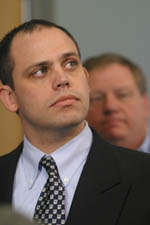Naked City
APD, City Kick Off 'Dialogue'
By Mike Clark-Madison, Fri., Nov. 21, 2003
Owens was the third African-American citizen to be fatally shot by local law enforcement in a 12-month period, but Glasgow -- who is white, as were the officers in the other cases -- is the first APD officer to face criminal charges in an on-duty shooting in recent memory. The grand jury's indictment of Glasgow on a charge of "criminally negligent homicide" -- a count that, under state law, will be difficult to prove at trial -- has created controversy, with community activists alleging that prosecutors intentionally botched the indictment.
In its report, the grand jury -- led by retired criminal defense attorney Gordon Rubinett and retired APD Capt. Freddie Maxwell, the department's first African-American officer to attain that rank -- makes no reference to the specifics of Glasgow's case (as indeed it shouldn't, given the confidential nature of grand jury proceedings). But the report says the panel "heard many cases where a different brand of law enforcement appears to occur in the minority neighborhoods of East Austin. We see what appears to us to be a double standard, and we are disturbed by it." The grand jury goes on to suggest that too many young and green officers are assigned to patrol those neighborhoods -- "It appears to us that [APD and other agencies] are placing the officers with the fewest skills and least experience in situations they have not been prepared for. This is not fair to these officers or to our community."
The City Hall response has been carefully calibrated to gently contest some of the grand jury's assessments without disputing the report's sincerity or validity. Futrell, APD Chief Stan Knee, and Mayor Will Wynn all noted that, while APD patrol officers are often new to the force -- a consequence of the department's rapid growth and of the standard practice of assigning new officers to patrol duty -- the typical APD cop on the street is over 30 years old, has at least two years of college education, and is likely to have military service or other work experience. "The days when a 21-year-old bagging groceries at HEB decides ... he wants to be a police officer are over," Knee noted. The staffing statistics for APD's Central East area command -- location of all three shootings -- are not much different. Knee did note, however, that APD does not and will not make a special effort to assign officers of color to work in communities of color -- "That would be a step backwards."
Futrell, Knee, Wynn, new Police Monitor Ashton Cumberbatch, and six members of the City Council all echoed the theme: During Knee's tenure, the department has grown by 50%. But so have its community policing efforts, its forums for public involvement, and its technological resources (including, by year's end, video cameras in every patrol vehicle), in response to both internal and external calls for greater sensitivity and awareness. While the results have often been positive -- Knee noted that Central East has the lowest violent-crime rate of any residential sector of the city -- nevertheless, all agree to keep doing more. The major new initiative has to do with improving and expanding training, for both new and veteran officers. To this end, a "training needs assessment" will be conducted, involving facilitated discussions both inside APD and in the community, to identify holes in the current curriculum.
Even more important, Knee suggests, is the need for APD -- actually, for Knee personally -- to figure out how to allow officers more time to be citizens and serve other citizens, instead of rushing, from one call to another, into community consciousness as an intervening (if not outright hostile) force. "Cities with successful community policing programs give officers time to know the people they protect and serve," Knee said. "We have not been able to do that."
City leaders also suggested that the frayed relationship between APD and East Austin signifies a broader lack of social equity that will be hard to solve. "We're back to a rebuilding mode on trust," said Futrell. "We need to come up with the right mix of investments, of attention, of communication tools, and of diversity in the workforce that reflects the community that we serve." This will require just the kind of "honest dialogue" that the grand jury seeks in its report.
"Is it a complex set of circumstances? You betcha," said Wynn at the end of the press event. "If anyone has the answer, please tell us what it is."
Got something to say on the subject? Send a letter to the editor.










